Michael Solomon cooks "Zahav" at Parish. 6 p.m. Nov. 11. $75 plus tax and gratuity. Includes wine and autographed cookbook. Reservations required. 240 N. Highland Ave., Atlanta. 404-681-4434, parishatl.com.
Michael Solomonov with Steven Cook. A book talk and luncheon featuring recipes from "Zahav: A World of Israeli Cooking." 12:30 p.m. Nov. 12. $22, Marcus Jewish Community Center of Atlanta members; $27, nonmembers. Purchase tickets at atlantajcc.org/pldb-live/michael-solomonov-br-with-steven-cook-br-i-zahav-a-world-of-israeli-cooking-i-br-29935. MJCCA Book Festival, Zaban Park, 5324 Tilly Mill Road, Dunwoody. 678-812-4005, atlantajcc.org.
Chef Michael Solomonov has been showcasing Israeli cuisine since 2008, when he opened his acclaimed Philadelphia restaurant Zahav.
Now, with the release of Solomonov’s first cookbook, “Zahav: A World of Israeli Cooking” (Houghton Mifflin Harcourt/Rux Martin Books, $35), home cooks can re-create the famed dishes of Zahav in their own kitchens.
Atlantans can meet Solomonov this week and get a taste of his modern Israeli cooking style when he visits the city as part of his book tour. On Nov. 11, Solomonov will be at Parish, a brasserie and cafe in Inman Park, for a four-course dinner presented by chef Stuart Tracy. On Nov. 12, Solomonov will speak during a luncheon at the Marcus Jewish Community Center of Atlanta in Dunwoody as part of the MJCCA’s book festival. Both events will feature dishes from recipes in the new cookbook.
When the Israeli-born Solomonov opened Zahav with his business partner and cookbook co-author Steven Cook, few people were informed about Israeli cooking.
“What most people knew about Israeli food began and ended with hummus and falafel,” Solomov wrote in the introduction to the book. Some seven years later, the James Beard Award-winning chef thinks that “people’s appreciation is much greater,” in part because diners are more adventurous. “There is a willingness to try,” he said.
In the cookbook, Solomonov shares recipes for familiar dishes — from falafel to matzo ball soup to the chickpea-based dip hummus that put Zahav on the map. The secret to success with the latter, he noted, is in preparing the tahini — the nutty sesame paste-based sauce that is quintessential to the Israeli kitchen — cooking the chickpeas long enough and thoroughly pureeing the dip until creamy. Compared with Greek-style hummus, the Israeli take incorporates more tahini and is not redolent with garlic or lemon.
Besides a full chapter on tahini, Solomonov also offers ideas for salatim (vegetable starters and salads), mezze (small bites, like stuffed grape leaves, latke with gravlax and fried kibbe), meat dishes that range from kebabs to braised brisket for a crowd, and desserts such as honey cake and Turkish coffee ice cream.
Solomonov calls Israel “a barely melted pot of cultures from all over the world.” Thus, his recipes showcase the flavors of the Middle East, Mediterranean, Eastern Europe and West Africa.
Between clear instructions, full-color photos and introductory explanations for each dish written from a personal perspective, “Zahav” is approachable for even the novice home cook.
“We want people using the book,” Solomonov said. “People can really cook everything in it.”
Like the food served at his restaurant, the book offers seasonal takes on Israeli cooking, such as salads.
“We don’t have access to tomatoes nine months out of the year,” Solomonov said. “We have to think long and hard how we’re going to express Israeli salads.”
He noted that recipes in the book for kale tabbouleh with walnut and pomegranate or pumpkin broth with noodles were both ripe for fall cooking.
Across the country, there has been an increase in restaurants focusing on Israeli cooking, Solomonov said, citing as examples Todd Ginsberg’s Yalla at Krog Street Market as well as newer eateries in Florida and southern California.
New Israeli cuisine is “definitely a thing,” he said.
About the Author
The Latest
Featured


